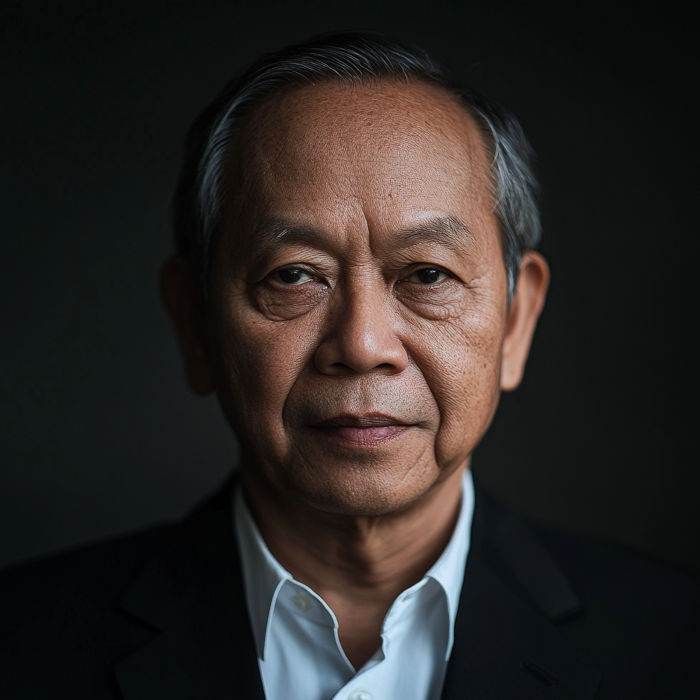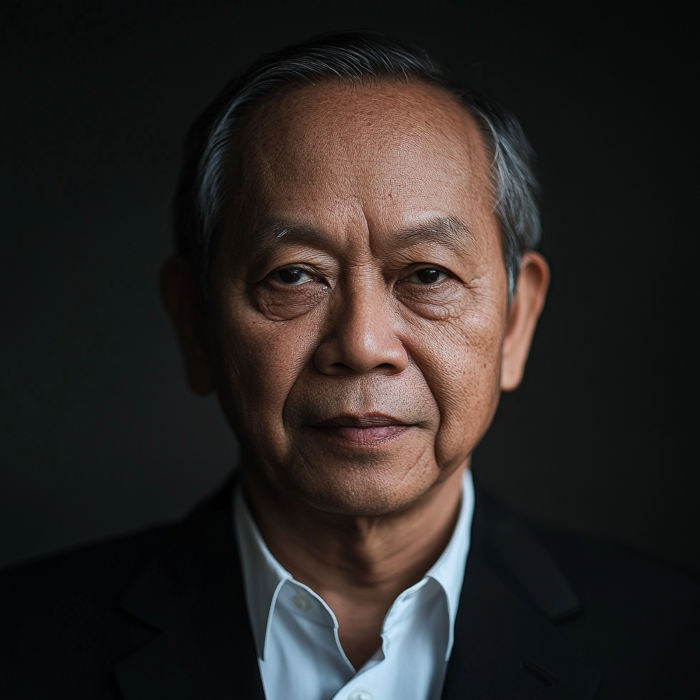


Nguyen Van Thieu (1923–2001) was a Vietnamese military officer and politician who served as the President of South Vietnam from 1967 until 1975. Thieu was a prominent figure during the Vietnam War, leading South Vietnam during one of the most tumultuous periods in the country’s history. His leadership was marked by his attempts to maintain control in the face of the growing communist insurgency led by the Viet Cong and the North Vietnamese Army (NVA). Thieu faced significant challenges, including the reliance on American military support and the subsequent decline of South Vietnam following the U.S. withdrawal.
Birth and Background: Nguyen Van Thieu was born on April 5, 1923, in Phan Rang, a coastal province in central Vietnam, then part of French Indochina. He was raised in a middle-class, rural family. Thieu received a traditional education in his early years before enrolling in the French-run Quoc Hoc High School in Hue, where he graduated in 1940.
Entry into the Military: During World War II, Vietnam was occupied by Japan, leading to a power vacuum at the end of the war. Thieu initially joined the Viet Minh, the communist-led resistance movement fighting for independence from French colonial rule. However, he soon became disillusioned with the communist ideology and left the Viet Minh to join the Vietnamese National Army (VNA), which was allied with the French colonial authorities against the communists. Thieu pursued a military career, receiving training in both France and Vietnam, and later rising through the ranks as an officer.
Role in the Army of the Republic of Vietnam (ARVN): After the Geneva Accords of 1954 divided Vietnam into a communist North Vietnam and a non-communist South Vietnam, Thieu continued to serve in the Army of the Republic of Vietnam (ARVN). He gained recognition for his loyalty to the newly established government of South Vietnam and his role in leading military operations against the communist insurgency. He rose through the ranks and became a brigadier general by 1962.
Coup and Political Instability: In 1963, Thieu was involved in the military coup that overthrew the South Vietnamese President Ngo Dinh Diem, who had become increasingly unpopular due to his authoritarian rule and the persecution of Buddhist monks. Following Diem's assassination, South Vietnam entered a period of political instability, with a series of military coups and changes in leadership. During this time, Thieu continued to play an important role in the military.
Emergence as a Leader: In 1965, following yet another coup, Thieu was appointed as the Chief of State of South Vietnam, effectively becoming the head of the government. Alongside Prime Minister Nguyen Cao Ky, Thieu led a military junta that sought to bring stability to the country amid the growing threat of the communist Viet Cong insurgency in the South and increasing military involvement by North Vietnam.
Presidential Election of 1967: In 1967, South Vietnam held its first presidential election under a new constitution designed to provide greater political stability. Nguyen Van Thieu ran as a candidate, with Nguyen Cao Ky as his running mate. Although the election was marred by allegations of irregularities and fraud, Thieu emerged victorious, becoming the President of the Republic of Vietnam in September 1967. He would remain in power until the fall of Saigon in 1975.
Military and Political Challenges: As President, Thieu faced enormous challenges, including maintaining control over South Vietnam in the face of the growing communist insurgency and dealing with the widespread corruption and inefficiency that plagued the government and military. Thieu's administration relied heavily on American military and economic aid to sustain the war effort against the communist forces.
The Tet Offensive (1968): In 1968, Thieu's leadership faced a major test during the Tet Offensive, a large-scale attack by the Viet Cong and North Vietnamese Army on major cities and military bases across South Vietnam. Although the Tet Offensive was ultimately a military failure for the communists, it had a significant psychological impact, undermining confidence in the South Vietnamese government and the U.S. commitment to the war. Despite this, Thieu remained in power and focused on rebuilding the country's military capabilities.
Pacification Program and Land Reforms: Thieu implemented a pacification program aimed at winning the "hearts and minds" of the rural population, which included providing economic assistance, improving infrastructure, and increasing local security. He also enacted a land reform program that redistributed land to tenant farmers, hoping to undermine the appeal of the communist insurgency in rural areas. These efforts had mixed success, as corruption and inefficiencies limited their impact.
U.S. Withdrawal and Vietnamization: In 1969, U.S. President Richard Nixon introduced the policy of Vietnamization, which aimed to gradually withdraw American troops from Vietnam while transferring the burden of combat operations to the South Vietnamese forces. Thieu supported this policy, though he had concerns about the ARVN's ability to fight effectively without substantial U.S. support. By 1973, almost all U.S. combat troops had left Vietnam, and the ARVN was left to face the North Vietnamese forces largely on its own, with only financial and logistical support from the United States.
Paris Peace Accords (1973): In 1973, the Paris Peace Accords were signed, ostensibly ending direct U.S. involvement in the Vietnam War. The agreement called for a ceasefire, the withdrawal of American troops, and the release of prisoners of war. Although Thieu was initially opposed to the terms of the accords, which allowed North Vietnamese troops to remain in the South, he ultimately agreed under pressure from the United States. Despite the agreement, fighting between North and South Vietnam continued, and Thieu faced increasing difficulties as American financial and military aid declined.
Collapse of South Vietnam: By 1975, with dwindling American support and increasing pressure from North Vietnamese forces, South Vietnam was on the verge of collapse. The North Vietnamese launched a major offensive in March 1975, quickly overwhelming the ARVN forces. The South Vietnamese military was poorly equipped, demoralized, and unable to mount an effective defense without American air support and financial assistance.
Resignation and Exile: On April 21, 1975, as the North Vietnamese forces closed in on Saigon, Thieu announced his resignation in a televised speech. He blamed the United States for failing to honor its commitments to South Vietnam, accusing the U.S. of abandoning the country. After stepping down, Thieu fled to Taiwan and then to the United Kingdom before eventually settling in the United States, where he lived in relative obscurity until his death.
Fall of Saigon: Just nine days after Thieu's resignation, on April 30, 1975, Saigon fell to the North Vietnamese forces, marking the end of the Vietnam War and the reunification of Vietnam under communist rule. The fall of Saigon was a devastating blow to Thieu and the South Vietnamese who had fought against the communists for years, and it marked the beginning of a difficult period for the country.
Life in Exile: After leaving Vietnam, Thieu lived in exile, primarily in the United States, where he led a quiet life and largely stayed out of the public eye. He settled in Foxborough, Massachusetts, where he lived with his wife and children. Thieu remained bitter about the U.S. withdrawal from Vietnam and the subsequent fall of his government, and he seldom made public appearances or gave interviews.
Death: Nguyen Van Thieu passed away on September 29, 2001, in Boston, Massachusetts, at the age of 78. He died of a stroke after suffering from poor health for several years. His death was met with mixed reactions, as he was remembered by some as a leader who fought to defend South Vietnam against communism, while others criticized his leadership and his inability to effectively govern the country during the war.
Controversial Leader: Nguyen Van Thieu's legacy remains controversial. Supporters view him as a patriot who fought to preserve South Vietnam's independence against a determined and well-resourced communist enemy. They argue that his leadership was undermined by factors beyond his control, such as the lack of sustained American support and the overwhelming military power of North Vietnam.
Criticisms: Critics, however, point to Thieu's authoritarian rule, his inability to curb corruption, and his failure to rally the South Vietnamese people effectively. His government was plagued by inefficiency, corruption, and a lack of popular legitimacy, which weakened South Vietnam's ability to resist the communist forces. Thieu's leadership style was often seen as autocratic, and he struggled to build a cohesive political structure capable of mobilizing the South Vietnamese population.
Vietnam War and American Involvement: Thieu's tenure as President of South Vietnam is closely tied to the broader context of the Vietnam War and American foreign policy in the region. The collapse of his government following the withdrawal of American forces highlighted the fragility of South Vietnam and the challenges faced by the ARVN in sustaining the war effort without external support. Thieu's criticisms of the United States' failure to uphold its commitments were echoed by many in South Vietnam who felt abandoned by their ally.
Impact on Modern Vietnam: The fall of Saigon and the reunification of Vietnam under communist rule marked the end of South Vietnam as an independent entity. The years that followed were marked by significant challenges, including economic difficulties and political repression. Thieu's efforts to build a non-communist state in the southern part of Vietnam ultimately failed, but his story remains an important part of the history of the Vietnam War and the broader struggle for control of the country.
Nguyen Van Thieu was a key figure in South Vietnam during one of the most challenging periods in its history. As President, he sought to lead South Vietnam in its fight against the communist insurgency and maintain independence with the help of American military and financial support. Thieu's leadership was marked by his determination to resist communism, but it was also hindered by corruption, inefficiency, and political instability.
The fall of Saigon in 1975 and the subsequent reunification of Vietnam under communist rule marked the end of Thieu's vision for a non-communist South Vietnam. His legacy is complex and remains a subject of debate, reflecting the broader challenges faced by the country during the Vietnam War. Despite the ultimate collapse of South Vietnam, Nguyen Van Thieu's efforts to lead and defend the country against overwhelming odds are remembered as an important part of the history of Vietnam and the Cold War era.

We use cookies
We use cookies and other tracking technologies to improve your browsing experience on our website, to show you personalized content and targeted ads, to analyze our website traffic, and to understand where our visitors are coming from. Privacy Policy.